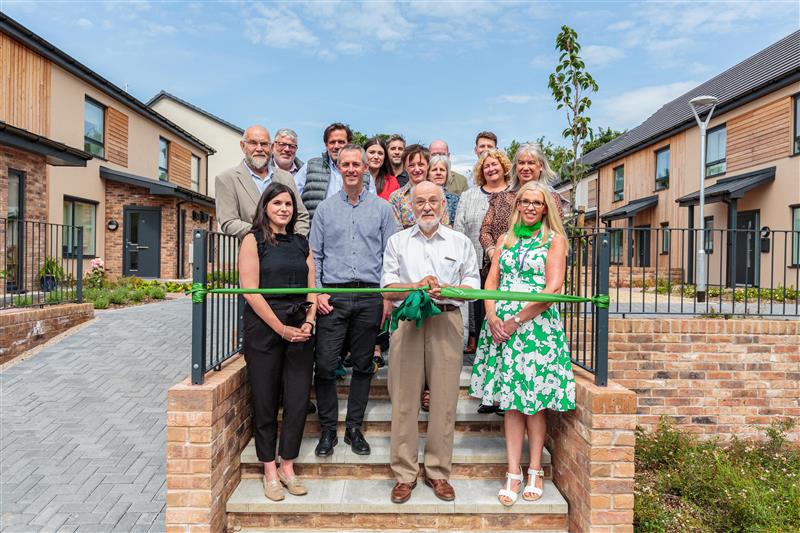Halton Celebrates Opening of 20 New Affordable Eco ‘Passivhaus’ Homes ‘fit for the 21st century’.

20 new build energy saving ‘Passivhaus’ Homes ‘fit for the 21st century’ were officially opened in the rural village of Halton, Lancaster in early July by Charles Ainger, Chair of Lune Valley Community Land Trust.
This unique development successfully demonstrates how local communities, housing associations, council’s and Homes England can work together to deliver truly affordable, eco-friendly, high-quality homes in rural communities for the benefit of local people.
The development known as Lune Walk, is made up of 13 affordable rented and 7 shared ownership homes, all of which are now let or sold. Key to this project’s success has been the collaboration between the local community group Lune Valley Community Land Trust, South Lakes Housing, Lancaster City Council and Homes England, with support from RP Tyson Construction, John Gilbert Architects, R G Parkins and Partners and Elliot Associates. Both Homes England and Lancaster City Council have also contributed significant grant funding to the scheme.
Each eco-friendly, affordable home is Passivhaus accredited, which is a gold standard for energy efficiency that reduces the buildings ecological footprint. The homes are built with meticulous attention to detail and to rigorous design and construction standards according to principles developed by the Passivhaus Institute in Germany. The homes will generally need 90% less energy for heating and hot water than standard buildings and should achieve very low running costs.
Charles Ainger, Chair of Lune Valley Community Land Trust, cut the ribbon to formally open the Lune Walk development. He stated “It’s really important to pay attention to the most vulnerable in our society. Providing affordable, low energy, community homes is a win-win, good for people, the planet and the housing provider. Passivhaus homes are good for health and people don’t get in rent arrears. We see this as a demonstration project. It is the only way to build houses fit for the 21st century.”
As part of the official opening guest speaker, Professor Mike Berners-Lee from Lancaster University (researcher, author and Director of Small World Consulting) said “We urgently need to build more energy efficient housing less dependent on the car if we are to tackle the many environmental crises facing the world. It is so important to get housing right, this is such a positive development. I would love to be living in a place like this…you can get low energy housing, be able to swim every morning in the river, cycle into your city and have infrastructure on your doorstep.”
For many of the partners involved in this scheme, Lune Walk was their first Passivhaus development and delivering this project has been a huge learning curve for how to design, cost and build eco homes.
Ian Munro, Chair of South Lakes Housing, reiterated this by saying ‘South Lakes Housing have learnt a huge amount from being involved in the scheme and are now keen to build more
Passivhaus homes. As a housing association, South Lakes Housing are commited to delivering high quality sustainable homes.’
Philip Helm from R P Tyson Construction reinforced how unique the project was by saying “It was one of those projects which ignites the imagination, within a month of winning the project, we felt like we were doing a Passivhaus PhD!” He spoke of how the “hugely visited site” has spread knowledge, skills and innovation across their supply chain, with “1000 training days provided and 23 subcontractors upskilled.” RP Tyson’s hard work has paid off and they have successfully secured their second Passivhaus project in Wigan for Wigan Council.
Lune Valley Community Land Trust, South Lakes Housing and Lancaster City Council are keen to deliver more developments like Lune Walk.
Councillor Caroline Jackson, cabinet member for housing on Lancaster City Council, said: “This scheme is evidence of the amazing power of local partnerships. Lancaster City Council has been delighted to provide direct support to Lune Walk, our first local community led housing scheme providing 20 new affordable homes in the Lancaster district. The passivhaus standard achieved completely aligns to the council’s actions on climate change and in tackling fuel poverty. Given the unprecedented demand for social and affordable housing locally, the new homes have provided much needed housing for local residents in housing need.”
If you would like to see a similar development in your community or have land available that could be used for affordable housing, get in touch with your local council or housing association and help support the delivery of eco homes for local people.
< Back to News
